-
ORIGINAL ARTICLE07-29-2024
Contribution of informal caregivers to self-care in individuals with heart failure
Revista Brasileira de Enfermagem. 2024;77(3):e20230492
Abstract
ORIGINAL ARTICLEContribution of informal caregivers to self-care in individuals with heart failure
Revista Brasileira de Enfermagem. 2024;77(3):e20230492
DOI 10.1590/0034-7167-2023-0492
Views0See moreABSTRACT
Objectives:
to evaluate the contribution of informal caregivers to the self-care of individuals with heart failure.
Methods:
a cross-sectional study was conducted with 87 caregivers from March to October 2022 in the city of João Pessoa/PB. The caregivers’ contribution was assessed using the Caregiver Contribution to Self-Care of Heart Failure Index instrument. Scores ≥ 70 points indicate adequate contribution. Data were analyzed using descriptive statistics and Spearman’s correlation.
Results:
the sample consisted of 81.6% female caregivers. Median scores obtained for the self-care contribution scales were: 63.3 for maintenance; 55.5 for management; and 66.6 for confidence. Caregivers never or rarely recommended monitoring body weight, regular physical exercise, extra use of diuretics, and fluid restriction.
Conclusions:
informal caregivers showed inadequate contribution in the areas of maintenance, management, and confidence in self-care of individuals with heart failure.
-
ORIGINAL ARTICLE07-29-2024
Mental health of parents of children and adolescents who require special health care
Revista Brasileira de Enfermagem. 2024;77(3):e20230457
Abstract
ORIGINAL ARTICLEMental health of parents of children and adolescents who require special health care
Revista Brasileira de Enfermagem. 2024;77(3):e20230457
DOI 10.1590/0034-7167-2023-0457
Views0See moreABSTRACT
Objective:
To identify the manifestations presented by parents of children and adolescents who require special health attention that can impact their mental health.
Methods:
exploratory, qualitative research, based on the concept of vulnerability, with data collection carried out through interviews with 18 parents of children and adolescents with special health care needs, hospitalized in the pediatric ward of a hospital in Paraná, between May/2017 and May/ 2018. Data analyzed by inductive thematic analysis.
Results:
parents experienced situations of vulnerability when providing care at home, with repercussions on their mental health, expressed by manifestations of lack of protection, anxiety and depression.
Final considerations:
It is important that health professionals seek to expand actions to promote care and reduce situations that generate threats, insecurities, concerns and damage to the health of parents, which can impact and further weaken care for children and adolescents who need attention especially health.
-
07-29-2024
Reflections on theoretical framework use in nursing research
Revista Brasileira de Enfermagem. 2024;77(3):e20230486
Abstract
Reflections on theoretical framework use in nursing research
Revista Brasileira de Enfermagem. 2024;77(3):e20230486
DOI 10.1590/0034-7167-2024-0486
Views0See moreABSTRACT
Objectives:
to reflect on theoretical framework use in nursing research.
Methods:
a theoretical-reflexive study, based on concepts and constructs pertinent to using nursing theories and other sciences, considering issues of epistemology or philosophy of science.
Results:
we presented what it is and why to do nursing research and what a theoretical framework is and why to use it, in addition to some considerations regarding theoretical framework use in nursing research, essential for constructing disciplinary knowledge, which enables the materialization of researchers’ work and the presentation of propositions resulting from investigations in and for nursing as a discipline and science.
Final Considerations:
based on a reflection based on epistemological conceptions, it is possible to affirm that a theoretical framework is the core of researchers’ thinking, delimiting a problem to be investigated and, based on it, outlining methodological strategies to be followed, supporting nursing action and thinking as discipline and science.

-
REVIEW07-29-2024
Nursing diagnoses for people hospitalized with heart failure: an integrative review
Revista Brasileira de Enfermagem. 2024;77(3):e20230471
Abstract
REVIEWNursing diagnoses for people hospitalized with heart failure: an integrative review
Revista Brasileira de Enfermagem. 2024;77(3):e20230471
DOI 10.1590/0034-7167-2023-0471
Views0See moreABSTRACT
Objectives:
to identify in the literature the main nursing diagnoses according to the NANDA-I diagnostic classification for people hospitalized with heart failure.
Methods:
an integrative literature review, carried out in February 2019 and updated in July 2023, in the MEDLINE via PubMed, LILACS, SciELO and CINAHL databases. Given the use of acronym PEO, studies without a time cut in Portuguese, English and Spanish were included. Descriptive analysis was carried out to present the identified information.
Results:
analysis of 27 articles identified 24 nursing diagnoses, with emphasis on Decreased Cardiac Output, Excessive Fluid Volume, Decreased Activity Tolerance and Fatigue.
Final Considerations:
evidence can contribute to better diagnostic decisions centered on people with heart failure in search of more assertive health results and have the potential to support future studies on a possible syndromic pattern in this population.

-
ORIGINAL ARTICLE07-29-2024
Disrupted mother-fetus dyad risk in high-risk pregnancies: a Middle-Range Theory
Revista Brasileira de Enfermagem. 2024;77(3):e20230464
Abstract
ORIGINAL ARTICLEDisrupted mother-fetus dyad risk in high-risk pregnancies: a Middle-Range Theory
Revista Brasileira de Enfermagem. 2024;77(3):e20230464
DOI 10.1590/0034-7167-2023-0464
Views0See moreABSTRACT
Objectives:
to develop and evaluate a Middle-Range Theory for the nursing diagnosis “Disrupted Mother-Fetus Dyad Risk” in high-risk pregnancies.
Methods:
this methodological study was conducted in two stages: theory development and evaluation. Dorothea Orem’s General Nursing Model was used as the theoretical-conceptual foundation. Evaluation was conducted using the Delphi method with seven judges, and consensus was achieved when the Content Validity Index of the evaluated items was ≥ 0.80.
Results:
the theory identified 20 elements of the nursing diagnosis “Disrupted Mother-Fetus Dyad Risk” (10 risk factors, 4 at-risk populations, and 6 associated conditions), 14 propositions, and 1 pictogram. After two rounds of evaluation, the theory was considered consistent, with consensus reached for all items, each achieving a Content Validity Index ≥ 0.80.
Conclusions:
the Middle-Range Theory included biopsychosocial factors explaining the nursing phenomenon “Disrupted Mother-Fetus Dyad Risk,” which aids in nurses’ diagnostic reasoning.
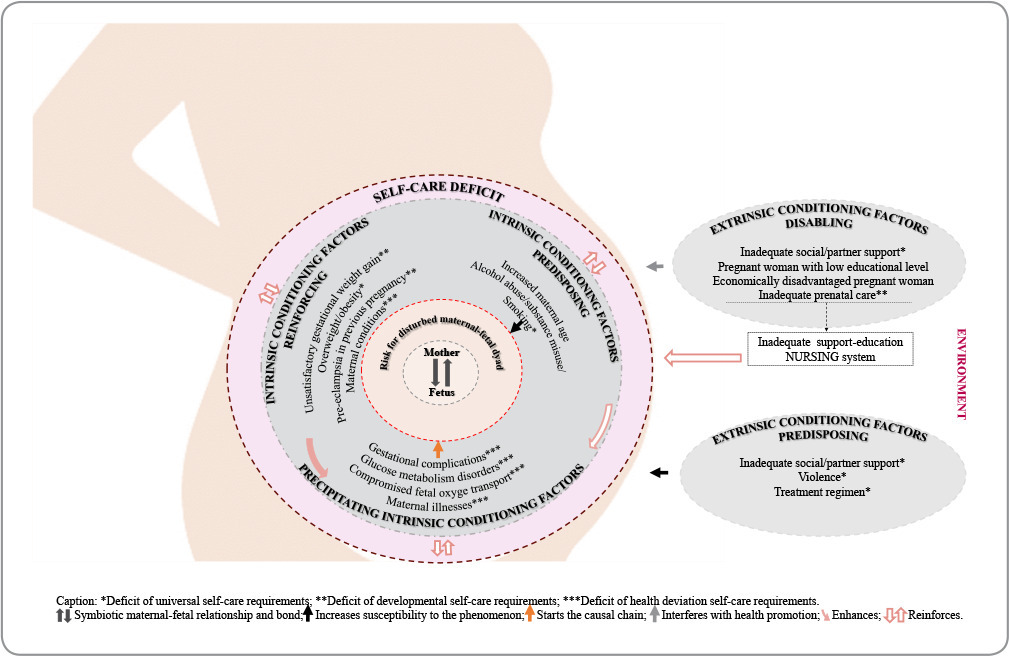
-
ORIGINAL ARTICLE07-29-2024
Family refusal of skin donation for transplantation: trends and associated factors
Revista Brasileira de Enfermagem. 2024;77(3):e20230209
Abstract
ORIGINAL ARTICLEFamily refusal of skin donation for transplantation: trends and associated factors
Revista Brasileira de Enfermagem. 2024;77(3):e20230209
DOI 10.1590/0034-7167-2023-0209
Views0See moreABSTRACT
Objectives:
to analyze the trends and factors associated with family refusal of skin donation for transplantation.
Methods:
this cross-sectional study was conducted in the State of São Paulo, with family authorization terms collected from 2001 to 2020. The variables analyzed included year, age, gender, cause of death, and type of institution. Data were analyzed using linear and multiple logistic regression, with the Odds Ratio estimated at p<0.05 for statistical significance.
Results:
1,355 individuals refused skin donation. The trend of refusals decreased between 2001 and 2009 in the age groups of 0-11 years and 12-19 years, but increased in the group aged ≥60 years. This trend continued to decrease in the 0-11 years group from 2010 to 2020, and increased in the 20-40 years group. Males and the age groups of 20-40 years, 41-59 years, and ≥60 years exhibited 27%, 34%, 47%, and 53% lower chances of refusal, respectively.
Conclusions:
there is an urgent need for measures to mitigate the high number of refusals associated with skin donation.
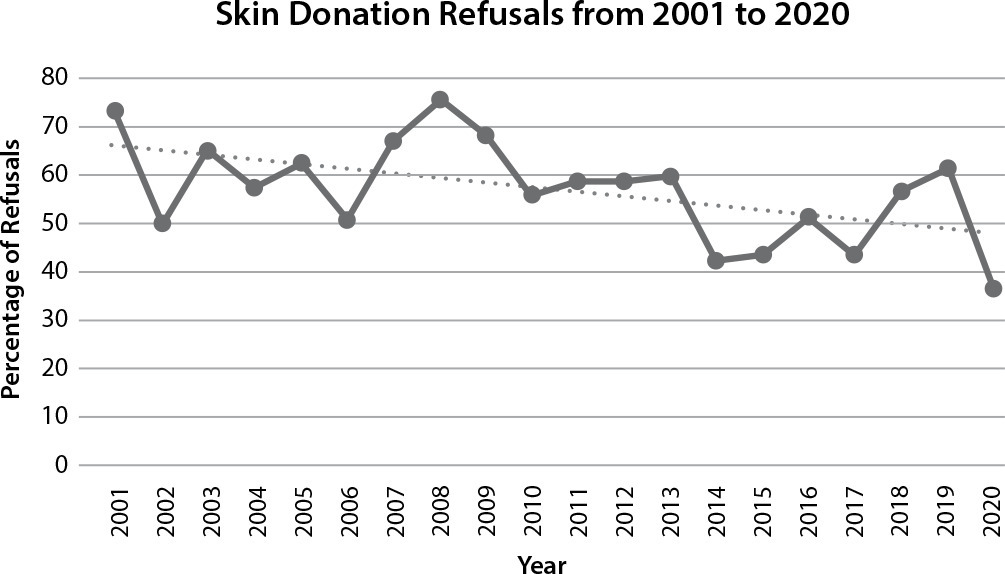
-
ORIGINAL ARTICLE07-29-2024
Primary Health Care in transitional care of people with stroke
Revista Brasileira de Enfermagem. 2024;77(3):e20230468
Abstract
ORIGINAL ARTICLEPrimary Health Care in transitional care of people with stroke
Revista Brasileira de Enfermagem. 2024;77(3):e20230468
DOI 10.1590/0034-7167-2024-0468
Views0See moreABSTRACT
Objectives:
to understand the role of Primary Health Care teams in caring for people with stroke after hospital discharge.
Methods:
single case study, with integrated units of analysis, with a qualitative approach. Data triangulation occurred through interviews with professionals and family caregivers involved in transition of care, in addition to direct observations in rounds and document analysis. For the analyses, the analytical strategies of theoretical propositions and construction of explanations were used, with the help of ATLAS.ti®.
Results:
the importance of counter-referral, the role of community health workers and the multidisciplinary team, health promotion, secondary prevention, home visits as a visceral attribute and nurses as care managers are evident.
Final Considerations:
the high demand on teams and the Social Determinants of Health interfere with adequate continuity of care. Transitional care programs that enable continuity of care are recommended.
-
ORIGINAL ARTICLE07-29-2024
Completeness of variables in Hospital-Based Cancer Registries for prostatic malignant neoplasm
Revista Brasileira de Enfermagem. 2024;77(3):e20230467
Abstract
ORIGINAL ARTICLECompleteness of variables in Hospital-Based Cancer Registries for prostatic malignant neoplasm
Revista Brasileira de Enfermagem. 2024;77(3):e20230467
DOI 10.1590/0034-7167-2023-0467
Views0See moreABSTRACT
Objectives:
to analyze the completeness of variables from Hospital-Based Cancer Registries of cases of prostate neoplasm in the Oncology Care Network of a Brazilian state between 2000 and 2020.
Methods:
an ecological time series study, based on secondary data on prostate cancer Hospital-Based Cancer Registries prostate. Data incompleteness was classified as excellent (<5%), good (between 5%-10%), fair (10%-20%), poor (20%-50%) and very poor (>50%), according to the percentage of lack of information.
Results:
there were 13,519 cases of prostate cancer in the Hospital-Based Cancer Registries analyzed. The variables “family history of cancer” (p<0.001), “alcoholism” (p<0.001), “smoking” (p<0.001), “TNM staging” (p<0.001) had a decreasing trend, while “clinical start of treatment” (p<0.001), “origin” (p=0.008) and “occupation” (p<0.001) indicated an increasing trend.
Conclusions:
most Hospital-Based Cancer Registries variables showed excellent completeness, but important variables had high percentages of incompleteness, such as TNM and clinical staging, in addition to alcoholism and smoking.
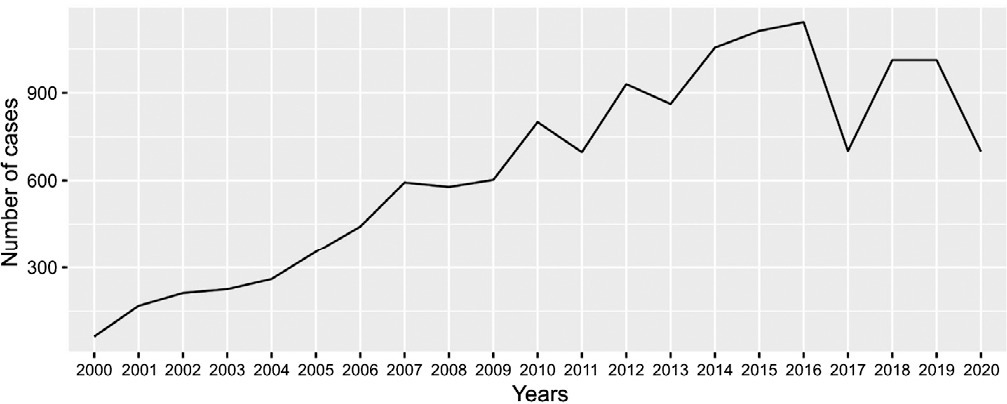
-
ORIGINAL ARTICLE12-04-2023
Burnout, ethical climate and work organization in covid-19 intensive care units: mixed method study
Revista Brasileira de Enfermagem. 2023;76:e20220684
Abstract
ORIGINAL ARTICLEBurnout, ethical climate and work organization in covid-19 intensive care units: mixed method study
Revista Brasileira de Enfermagem. 2023;76:e20220684
DOI 10.1590/0034-7167-2022-0684
Views0See moreABSTRACT
Objectives:
to analyze the association between burnout and the perception of the ethical climate in nursing professionals in the covid-19 Intensive Care Unit and the relationship with the organization of work from the perspective of managers of these units.
Methods:
mixed method study conducted in three university hospitals in southern Brazil from December 2021 to March 2022. A cross-sectional study was developed with 110 nursing professionals, followed by an exploratory-descriptive study through semi-structured interviews with six managers. Descriptive and analytical statistics and discursive textual analysis were used.
Results:
the prevalence of burnout was 10% and the perception of negative ethical climate was 24.5%. The association between burnout and ethical climate revealed overload and fatigue during working hours, related to tension, fear, and stress that emerged from the consequences of the organization and relations of work in the covid-19 Intensive Care Unit.
Conclusions:
there was an association between burnout and ethical climate and elements of the work organization.
-
ERRATUM02-26-2024
ERRATUM
Revista Brasileira de Enfermagem. 2024;77(1):e20160061
Abstract
ERRATUMERRATUM
Revista Brasileira de Enfermagem. 2024;77(1):e20160061
DOI 10.1590/0034-7167.20247701e03
Views2In the article “Nurses in the labor market: professional insertion, competencies and skills”, with DOI number: , published in Revista Brasileira de Enfermagem, 2017;70(6):1220-6, on page 1225:Include before REFERENCES:[…]See more -
ERRATUM06-14-2024
ERRATUM
Revista Brasileira de Enfermagem. 2024;77(2):e2024n2e06
Abstract
ERRATUMERRATUM
Revista Brasileira de Enfermagem. 2024;77(2):e2024n2e06
DOI 10.1590/0034-7167.20247702e06
Views2In the article “Is there scientific relevance to the plot of films and documentaries about eating disorders?”, with DOI number: , published in Revista Brasileira de Enfermagem, 2024;77(1):e20220547, page 7:Where it read:[…]See more -
ORIGINAL ARTICLE07-29-2024
Educational technology for multidisciplinary training for managing waiting lists for elective patients
Revista Brasileira de Enfermagem. 2024;77(3):e20230299
Abstract
ORIGINAL ARTICLEEducational technology for multidisciplinary training for managing waiting lists for elective patients
Revista Brasileira de Enfermagem. 2024;77(3):e20230299
DOI 10.1590/0034-7167-2023-0299
Views1See moreABSTRACT
Objectives:
to construct and assess an educational technology for managing patient waiting lists for multidisciplinary training.
Methods:
study supported by Instructional Design – ADDIE model, whose stages of construction of educational technology were developed in the form of a multi-professional training course. Its respective content assessment was carried out by a committee of experts from 2021 to 2022. The analysis occurred based on the proportion of content adequacy with 95% Confidence Interval.
Results:
seventeen products were created as educational technology learning objects: five storyboards; four videos; three comic books; two pedagogical action plans; a mind map; and a YouTube® playlist. Nine experts assessed content adequacy, which reached 0.89.
Conclusions:
this educational technology contributes to the performance of professionals who manage waiting lists by reducing inequalities, alleviating differences, in addition to promoting equity in care and good health for patients in the Brazilian Health System.

-
REVIEW11-22-2024
Spirituality and religiosity in children, adolescents and their families in a vulnerable context: a scoping review
Revista Brasileira de Enfermagem. 2024;77(5):e20230425
Abstract
REVIEWSpirituality and religiosity in children, adolescents and their families in a vulnerable context: a scoping review
Revista Brasileira de Enfermagem. 2024;77(5):e20230425
DOI 10.1590/0034-7167-2023-0425
Views1See moreABSTRACT
Objective:
to map evidence in the literature on the spirituality and religiosity of children, adolescents and their families in social vulnerability.
Methods:
this is a scoping review based on the JBI methodology, with the search without delimiting the time period, in English, Portuguese and Spanish, in the Virtual Health Library, PubMed, Embase, Cochrane Library, Scopus and Web of Science databases.
Results:
twenty-two studies were identified. The most studied population were adolescents, followed by children and their families. Regarding the setting, the context of vulnerability related to the low socioeconomic level experienced by these populations was highlighted. Furthermore, spirituality and religiosity were considered important for coping, social support, purpose and strength.
Conclusion:
there is an influence of spirituality and religiosity in the lives of children, adolescents and families, being a protective factor and a source of comfort, playing essential tools for living in context.

-
ORIGINAL ARTICLE12-13-2024
Stress in nursing workers caring for people with COVID-19
Revista Brasileira de Enfermagem. 2024;77(5):e20230542
Abstract
ORIGINAL ARTICLEStress in nursing workers caring for people with COVID-19
Revista Brasileira de Enfermagem. 2024;77(5):e20230542
DOI 10.1590/0034-7167-2023-0542
Views1See moreABSTRACT
Objectives:
to analyze stress from the perspective of nursing workers caring for people with COVID-19 in a public hospital in the Recôncavo region of Bahia.
Methods:
this is an exploratory qualitative study, conducted through semi-structured interviews. The data were analyzed using word clouds, similarity trees, and content analysis.
Results:
nursing workers were exposed to stress while attending to patients with COVID-19. The reported stressors in the workplace included: work overload, lack of planning, speed in performing tasks, fatigue, lack of participation in decision-making, lack of support from management, technological changes, excessive responsibility without preparation, interpersonal conflicts, and professional undervaluation.
Conclusions:
exposure to these stressors leads to emotional exhaustion and demotivation, which were intensified during the COVID-19 pandemic.

-
ORIGINAL ARTICLE01-13-2024
Knowledge, Attitudes, and Practices of nurses regarding blood culture collection
Revista Brasileira de Enfermagem. 2024;77(6):e20230424
Abstract
ORIGINAL ARTICLEKnowledge, Attitudes, and Practices of nurses regarding blood culture collection
Revista Brasileira de Enfermagem. 2024;77(6):e20230424
DOI 10.1590/0034-7167-2023-0424
Views2See moreABSTRACT
Objectives:
to investigate the knowledge, attitudes, and practices of nurses regarding blood culture collection.
Methods:
a cross-sectional study was conducted in five Brazilian public hospitals with 112 nurses. Data were collected using an adapted questionnaire and analyzed through descriptive and inferential statistics.
Results:
nurses who did not consider themselves capable of collecting blood cultures had a 72% lower chance of performing the collection at the recommended site and an 83% lower chance of using the same needle for blood inoculation into the vials. Nurses working in the emergency department had a 75% lower chance of knowing the international benchmark for blood culture contamination rates, and those with less than 5 years in the position decreased their chance of accuracy in this matter by 79%.
Conclusions:
there are gaps in the knowledge, attitudes, and practices of nurses regarding blood culture collection. Standardization of the technique, periodic education, supervision and guidance of the collection team, and process auditing are recommended coping strategies.

-
ORIGINAL ARTICLE01-10-2024
Inventory of ethical problems in mobile pre-hospital care
Revista Brasileira de Enfermagem. 2024;77:e20230539
Abstract
ORIGINAL ARTICLEInventory of ethical problems in mobile pre-hospital care
Revista Brasileira de Enfermagem. 2024;77:e20230539
DOI 10.1590/0034-7167-2023-0539
Views1See moreABSTRACT
Objective:
to construct and validate the content of an inventory of ethical problems experienced by nurses in mobile pre-hospital care.
Method:
a psychometric approach study, developed with the following stages: (1) instrument construction through a theoretical matrix based on deliberative bioethics, scoping review and online qualitative research; (2) content validity by judges; (3) pre-testing with Mobile Emergency Care Service nurses in various Brazilian states. For content validity analysis, the Content Validity Ratio was calculated (CVR>0.45 for judges and CVR>0.35 for the target population).
Results:
the instrument had 44 items, distributed across four dimensions.
Final considerations:
the constructed instrument presented sources of evidence of content validity, providing good psychometric measurements and constituting a useful tool for nurses’ practice in the pre-hospital setting.

-
ORIGINAL ARTICLE05-24-2021
Construction and validation of educational material on promoting breastfeeding in schools
Revista Brasileira de Enfermagem. 2021;74:e20200511
Abstract
ORIGINAL ARTICLEConstruction and validation of educational material on promoting breastfeeding in schools
Revista Brasileira de Enfermagem. 2021;74:e20200511
DOI 10.1590/0034-7167-2020-0511
Views1See moreABSTRACT
Objective:
to build and validate an educational technology on the promotion of breastfeeding for schoolchildren.
Methods:
a methodological study was developed through a bibliographic survey, situational diagnosis, creation of illustrations, layout, design and texts, validation of the material with the help of expert judges and target audience.
Results:
the content judges enabled the validation of the material with an overall Content Validity Index of 90%, the judges of the design Suitability Assessment of Materials of 90.4% and the target audience with a 95.6% agreement. The readability percentage proved to be excellent, with an overall score of 100%.
Conclusion:
the educational technology proved to be a valid and reliable instrument to promote a breastfeeding culture among schoolchildren.

-
ORIGINAL ARTICLE06-08-2020
Nurses’ responsibilities in the aerospace environment
Revista Brasileira de Enfermagem. 2020;73(4):e20180777
Abstract
ORIGINAL ARTICLENurses’ responsibilities in the aerospace environment
Revista Brasileira de Enfermagem. 2020;73(4):e20180777
DOI 10.1590/0034-7167-2018-0777
Views0See moreABSTRACT
Objectives:
to characterize the nurses who work in the aerospace environment and to identify their most frequent responsibilities during the pre-flight, flight, and post-flight periods.
Methods:
a quantitative, exploratory-descriptive research, conducted using a survey through Google forms®, from January to April of 2018, with 50 nurses from aerospace services in Brazil. Data were analyzed using descriptive statistics.
Results:
predominance of male participants (64%), mean age of 37 years, with a mean working time in the aerospace environment of six years, in helicopter (54%), and in the southern region (42%). The main pre-flight, flight, and post-flight activities were, respectively: verification/testing of equipment functionality, nursing care for patients, and replacement of supplies and equipment.
Conclusions:
In the aerospace environment, nurses’ work are primarily organizational and victim care actions, during all phases of the flight.
-
04-14-2021
Specialized nursing terminology for the care of people with COVID-19
Revista Brasileira de Enfermagem. 2021;74:e20200741
Abstract
Specialized nursing terminology for the care of people with COVID-19
Revista Brasileira de Enfermagem. 2021;74:e20200741
DOI 10.1590/0034-7167-2020-0741
Views0See moreABSTRACT
Objective:
To create specialized nursing terminology for the care of people with COVID-19.
Methods:
Methodological study, carried out based on the identification of concepts related to the care of the person with the infection, present in the official guidelines of the Brazilian Ministry of Health; the concepts were validated by three specialist nurses; and a cross-mapping of the extracted concepts was done with CIPE® 2019 primitive concepts.
Results:
Out of 436 unique concepts, being 399 of these validated; of these, 70.9% were in the Classification and referred to the nursing care of people with COVID-19. In the Axis, the concepts related to Focus, Action, and Environment stood out. As for the non-validated concepts, 78.4% were not included in the 2019 version of CIPE®.
Conclusion:
We were able to structure a specialized CIPE® terminology, with the potential to generate nursing care indicators for people with COVID-19.
-
ORIGINAL ARTICLE05-18-2020
Validation of the definitions of nursing diagnoses for individuals with Aids
Revista Brasileira de Enfermagem. 2020;73(4):e20180915
Abstract
ORIGINAL ARTICLEValidation of the definitions of nursing diagnoses for individuals with Aids
Revista Brasileira de Enfermagem. 2020;73(4):e20180915
DOI 10.1590/0034-7167-2018-0915
Views0See moreABSTRACT
Objectives:
to develop and validate conceptual and operational definitions of nursing diagnoses of the International Classification for Nursing Practice for people living with Aids.
Methods:
methodological study with 100 individuals with Aids, in a hospital school. In addition, 19 nurses selected from the Lattes platform acted as experts in the validation process. The research was conducted, using three moments: identification and validation of the nursing diagnoses; construction of the conceptual and operational definitions of the diagnoses, and content validation, using the content validity index.
Results:
a total of 35 diagnoses were identified and 18 had their conceptual and operational definitions validated, with validity index of ≥ 0.8.
Conclusions:
the construction of the conceptual and operational definitions enables nurses to analyze the clinical inferences and endorse the nursing diagnosis, contributing to its predictive capacity.
-
06-28-2021
Baby-Friendly Hospital Initiative for Neonatal Wards: impact on breastfeeding practices among preterm infants
Revista Brasileira de Enfermagem. 2021;74:e20200909
Abstract
Baby-Friendly Hospital Initiative for Neonatal Wards: impact on breastfeeding practices among preterm infants
Revista Brasileira de Enfermagem. 2021;74:e20200909
DOI 10.1590/0034-7167-2020-0909
Views0See moreABSTRACT
Objective:
to assess breastfeeding support practices for preterm infants at two Baby-Friendly hospitals in southeastern Brazil, comparing the effect of implementing the guidelines for Baby-Friendly Hospital Initiative for Neonatal wards.
Methods:
a quasi-experimental study, pre- and post-intervention with control. Implementation of this initiative in the intervention hospital using Knowledge Translation. Data collection on compliance with the adapted Ten Steps, Three Guiding Principles and the Code before and after the intervention was carried out via interviews with mothers of preterm babies and professionals, unit observation and documentary analysis in the intervention and control hospitals. Intra-intergroup comparison was performed.
Results:
increases in global compliance with the Three Principles, Ten Steps, the Code, partial compliance with each Principle and in most Steps was greater in the intervention hospital. Conclusion: this initiative improved practices related to breastfeeding in the intervention hospital, demonstrating the potential to improve care and breastfeeding in neonatal wards.

-
08-16-2021
The prevalence of the technocratic model in obstetric care from the perspective of health professionals
Revista Brasileira de Enfermagem. 2021;74:e20200689
Abstract
The prevalence of the technocratic model in obstetric care from the perspective of health professionals
Revista Brasileira de Enfermagem. 2021;74:e20200689
DOI 10.1590/0034-7167-2020-0689
Views0See moreABSTRACT
Objectives:
to identify the reasons for the prevalence of the technocratic model in obstetric care from the perspective of health professionals.
Methods:
Grounded Theory. Study approved by two Research Ethics Committees and conducted by theoretical sampling, from July 2015 to June 2017. Twenty-nine interviews were conducted with health professionals from two maternity hospitals in the Southern Region of Brazil. Data collection and analysis was performed alternately; and analysis by open, axial, and selective coding/integration.
Results:
the technocratic model still persists because the assistance is performed in a mechanized way, centered on the professionals. There is a lack of systematization of care, and under-dimensioning of the nursing staff.
Final Considerations:
obstetric nurses need to review their performance in obstetric centers, the internal organization, the dimensioning of nursing professionals, and become protagonists of care. Investment in academic training/updating the knowledge of midwifery professionals, based on scientific evidence and user-centered care is necessary.
-
REVIEW09-18-2020
Cloth masks as respiratory protections in the COVID-19 pandemic period: evidence gaps
Revista Brasileira de Enfermagem. 2020;73:e20200239
Abstract
REVIEWCloth masks as respiratory protections in the COVID-19 pandemic period: evidence gaps
Revista Brasileira de Enfermagem. 2020;73:e20200239
DOI 10.1590/0034-7167-2020-0239
Views0See moreABSTRACT
Objective:
to identify scientific evidence on the effectiveness of using cloth masks as safe protectors against COVID-19.
Method:
an integrative review of articles available in full obtained at PubMed, CINAHL, and Web of Science. Controlled, non-controlled descriptors and keywords such as “mask”, “home-made” and “cloth” or “cotton” and “infection control” or “infection prevention” were used.
Results:
thirty-eight articles were selected; of these, seven studies made up the sample. Evidence shows that cloth masks do not have the same protective characteristics as surgical masks, indicating an increased risk of infection due to humidity, diffusion of fluids, virus retention, and improper preparation. Considering the shortage of surgical masks during the pandemic, cloth masks could be proposed as a last resort.
Conclusion:
cloth masks should be used together with preventive measures, such as home insulation, good respiratory conduct, and regular hand hygiene.
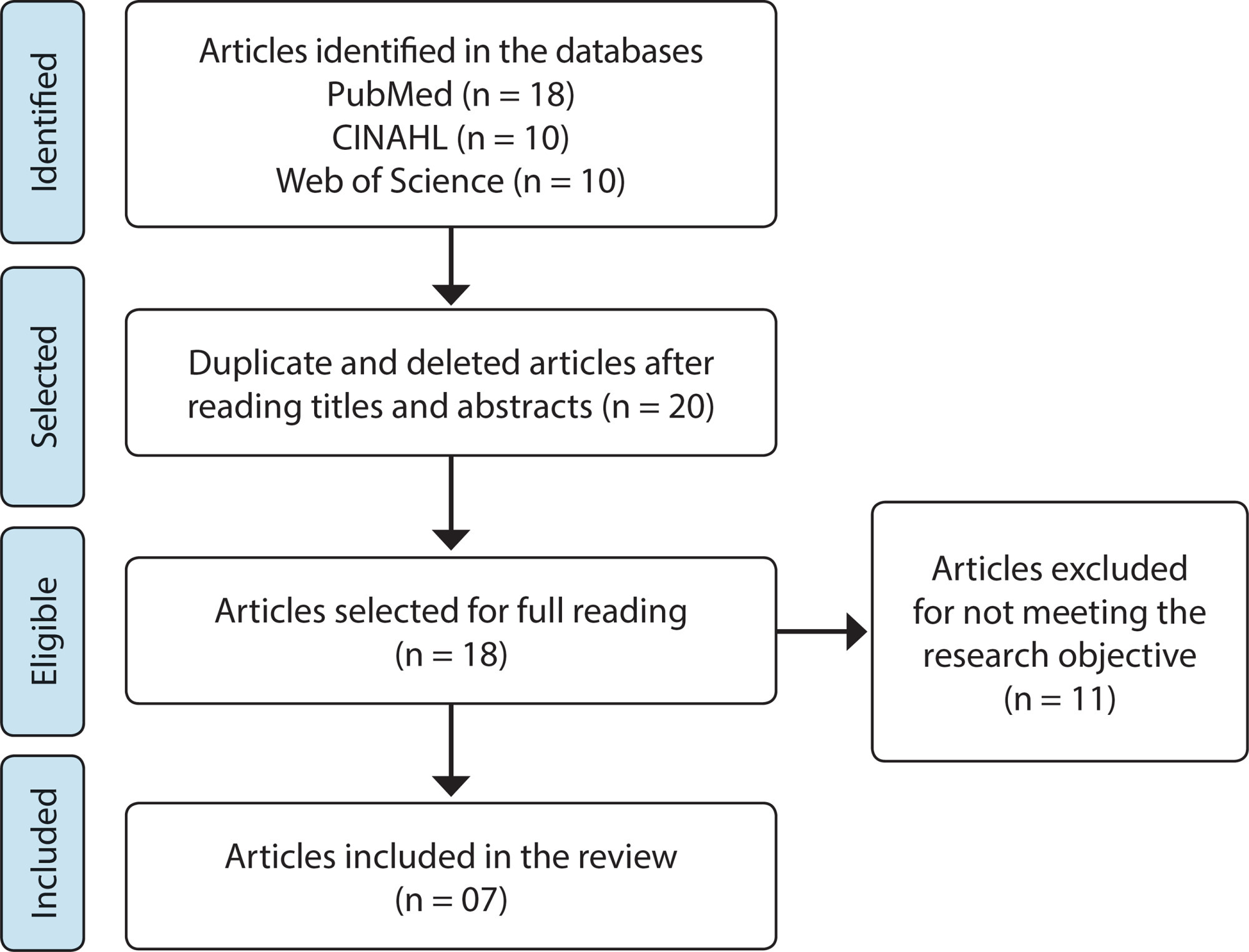
-
ORIGINAL ARTICLE06-01-2020
Primary care quality and its effects on leprosy monitoring indicators
Revista Brasileira de Enfermagem. 2020;73(4):e20190038
Abstract
ORIGINAL ARTICLEPrimary care quality and its effects on leprosy monitoring indicators
Revista Brasileira de Enfermagem. 2020;73(4):e20190038
DOI 10.1590/0034-7167-2019-0038
Views0See moreABSTRACT
Objectives:
to evaluate the quality of primary care in leprosy control actions, to correlate effects on monitoring indicators.
Methods:
a cross-sectional study, conducted in Belo Horizonte, from July to September 2014. Interviews with 408 professionals were conducted through the application of a tool that assesses attributes of primary care in leprosy control actions, and monitoring indicators were calculated. Spearman correlation was used, significance level p < 0.05.
Results:
the overall score correlated with the percentage of cases treated in primary care and of family health staff coverage. The derived score correlated with the percentage of cases treated in primary care, and the essential score correlated with the proportion and rate of cases diagnosed, with grade 2 physical disability.
Conclusions:
the quality of leprosy control actions performed by primary care professionals produces impacts on health indicators, and developing strategies consistent with the reality of the territory is necessary.
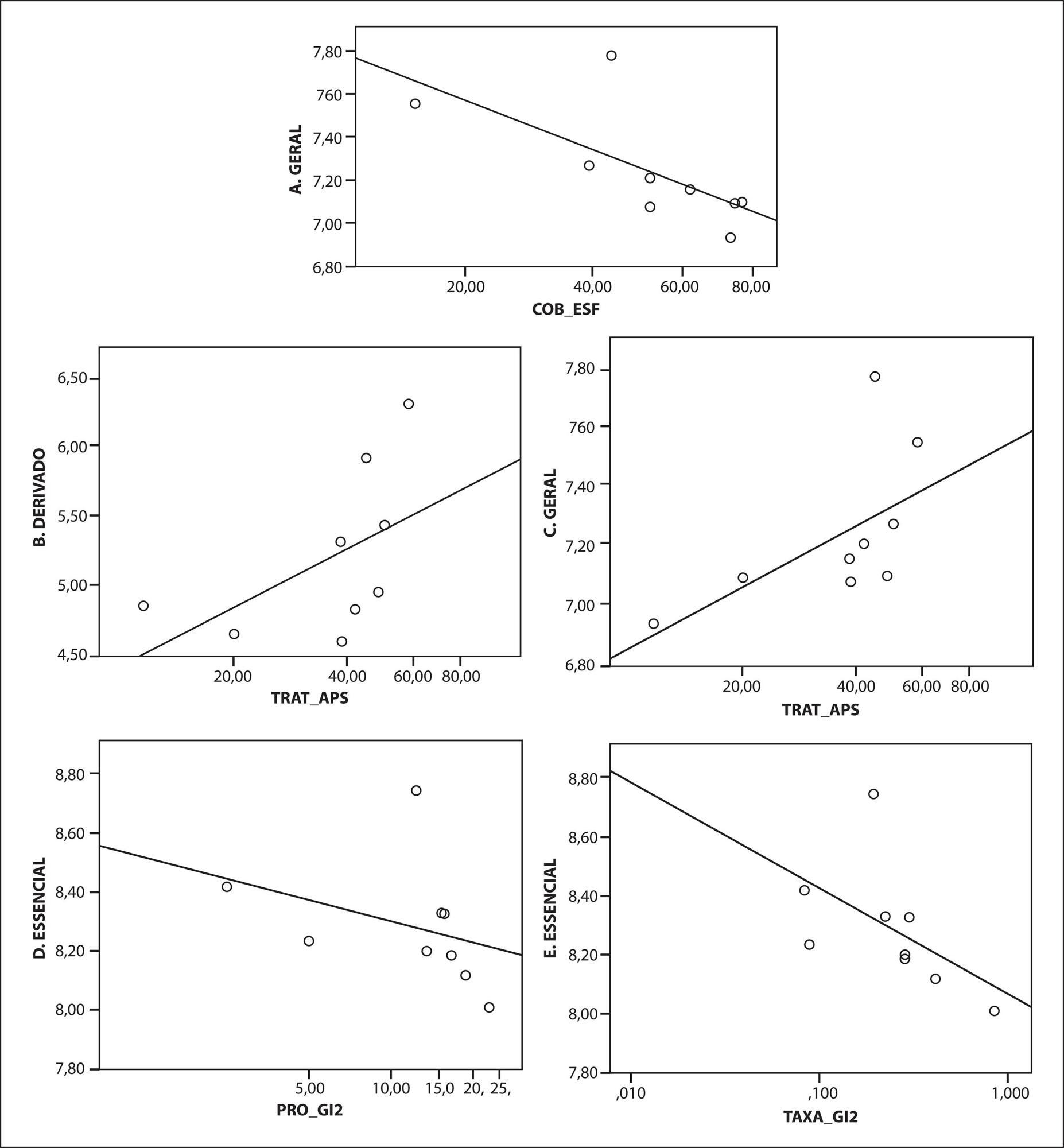
Search
Search in:
Nuvem de Tags
Adolescente (85) Atenção Primária à Saúde (239) COVID-19 (91) Criança (91) Cuidados de Enfermagem (269) Educação em Enfermagem (151) Educação em Saúde (139) Enfermagem (930) Enfermagem Pediátrica (86) Estudantes de Enfermagem (77) Estudos de Validação (131) Família (87) Idoso (208) Promoção da Saúde (99) Qualidade de Vida (104) Saúde do Trabalhador (86) Saúde Mental (145) Saúde Pública (82) Segurança do Paciente (150) Tecnologia Educacional (100)



